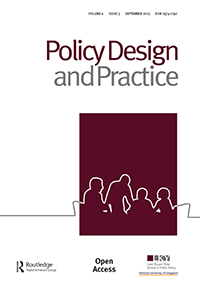构建具有内在影响力的研究项目:组织环境的作用
IF 2.6
Q1 PUBLIC ADMINISTRATION
引用次数: 2
摘要
摘要许多影响研究侧重于个人学者如何影响政策结果,从而提出关于个人研究人员如何更具创业精神并以创新方式参与政策周期的建议。这种方法存在问题,因为它强化了对研究人员是“英雄”个体的假设,掩盖了对组织环境如何支持或阻碍研究影响前景的考虑。因此,组织环境的重要性在大学的影响策略中经常被忽视。本文试图通过对澳大利亚国立大学太平洋事务系(DPA)在创建支持研究影响的背景方面的经验进行案例研究来解决这一差距。长期以来,国防部的研究方法一直包括强有力的政策重点,部分得益于澳大利亚政府的长期财政支持,以建立一个全球卓越的太平洋政策相关研究卓越中心。本文将重点放在DPA的组织环境作为一种影响机制上,考虑了可以为研究环境的发展提供信息的经验教训,这些研究环境是一种具有内在影响力的研究方法。本文章由计算机程序翻译,如有差异,请以英文原文为准。
Building inherently impactful research programs: the role of organizational context
Abstract Much impact research focuses on how individual scholars can influence policy outcomes, leading to recommendations about how individual researchers can be more entrepreneurial and engage with policy cycles in innovative ways. This approach is problematic in that it reinforces assumptions about researchers as “heroic” individuals, obscuring consideration of how organizational contexts support or hinder the prospects for research impact. As a result, the importance of organizational context is frequently absent from universities’ impact strategies. This article seeks to address this gap by presenting a case study on the experiences of the Department of Pacific Affairs (DPA) at the Australian National University (ANU) in creating a context that supports research impact. DPA’s research approach has long included a strong policy focus, aided in part by long-term financial support from the Australian government to build a globally preeminent center of excellence for policy-relevant research on the Pacific. Concentrating on DPA’s organizational context as an impact mechanism, the article considers lessons learned that can inform the development of research contexts that serve as an inherently impactful approach to research.
求助全文
通过发布文献求助,成功后即可免费获取论文全文。
去求助
来源期刊

Policy Design and Practice
PUBLIC ADMINISTRATION-
CiteScore
10.30
自引率
4.30%
发文量
19
审稿时长
13 weeks
期刊介绍:
 求助内容:
求助内容: 应助结果提醒方式:
应助结果提醒方式:


